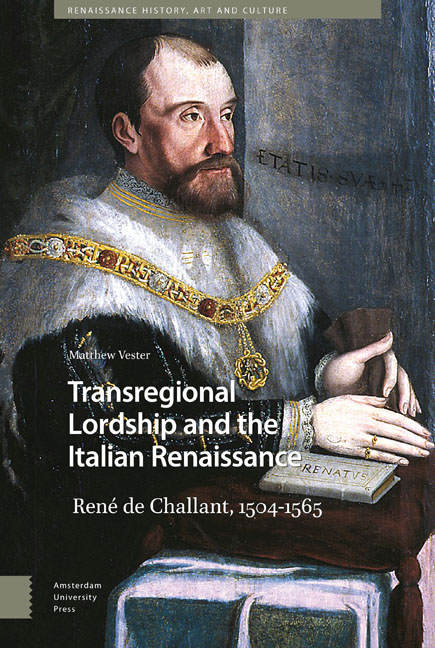Book contents
- Frontmatter
- Contents
- Maps and Tables
- Abbreviations
- Acknowledgments
- 1 On the edge of the Italian Renaissance
- 2 René's early career to 1536
- 3 René's growing influence during the war years, 1536-1553
- 4 René and Duke Emanuel Filibert
- 5 Kinship and noble life
- 6 The Challant political networks
- 7 Finance and brokerage
- 8 Lordship
- 9 The embodiment of spatial politics
- About the author
- Index
- Frontmatter
- Contents
- Maps and Tables
- Abbreviations
- Acknowledgments
- 1 On the edge of the Italian Renaissance
- 2 René's early career to 1536
- 3 René's growing influence during the war years, 1536-1553
- 4 René and Duke Emanuel Filibert
- 5 Kinship and noble life
- 6 The Challant political networks
- 7 Finance and brokerage
- 8 Lordship
- 9 The embodiment of spatial politics
- About the author
- Index
Summary
Abstract
René de Challant was the lord of lands some of which were well over 500 km apart from each other. This required a formidable organization of the practice of lordship, especially in the areas of revenue collection, account keeping, and the administration of justice. Valangin in particular, as a seigniory over which René was committed to demonstrating his sovereignty, demanded significant attention. René left detailed instructions concerning the administration of the barony of Beaufremont. Castellany accounts from Châtillon in the Valle d’Aosta and correspondence from Virieu in Bugey illustrate René's lordship over those places. René sometimes questioned the performance of officials whom he delegated to oversee his fiefs, occasionally interacting directly with his subjects as a way of keeping his officers in check.
Key words: lordship, fief, feudal revenue, seigniorial justice
We have seen how both René's career in the service of the House of Savoy and other rulers and the pursuit of his own transregional interests required of him a life of perpetual motion between Italy and transalpine Europe. The spatial dimension of his rights and responsibilities affected his family relationships, his political networks, and his finances. We now focus more explicitly on how the transregional dimension of René's authority imposed upon him a particular understanding and practice of lordship.
The most recent studies of René as a feudal dynast have situated him in the context of changing structures of domination within the Sabaudian lands without considering the transregional dimension of his lordship. François-Charles Uginet depicted René as the representative of ‘an aristocratic class whose continual concern was to maintain its own dominance in government’ and to ‘affirm its authority’. He was ‘one of the last exponents of the old feudal order in the Sabaudian states, who saw a position as the prince's natural counselor as his birthright’. For Uginet, however, René's ‘ingrained cowardice and his frequent preoccupation with his own personal interests’ prevented him from properly expressing his class consciousness. Alessandro Barbero has likewise situated René in a moment of historical transition, while challenging the idea that the transition automatically led to greater princely power. He first analyzed the Challant family in light of Federico Chabod's model of the historical transformation of the medieval aristocracy into a class of officials who mediated between the Prince and the ‘paese’.
- Type
- Chapter
- Information
- Transregional Lordship and the Italian RenaissanceRené de Challant, 1504–1565, pp. 251 - 286Publisher: Amsterdam University PressPrint publication year: 2020



